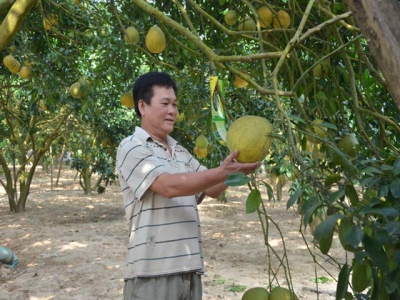Productivity of Tan Lac red pomelo hits 30 tonnes per ha

Tan Lac district of the northern mountainous province of Hoa Binh is home to about 1,046 ha of pomelo, with 395 ha currently ready for harvest. According to estimates of the People’s Committee of the district, productivity of pomelo in the 2018-2019 crop will be lower compared to the same period last year due to impact of natural factors. However, pomelo remains the district’s major plant with the most significant economic values.
Household cultivating Tan Lac red pomelo in Dong Tien village (Dong Lai commune) harvest the fruit with delight. It yields high productivity, high quality and its price stands at about 12,000-25,000 VND (0.15-1.07 USD) per fruit.
Specifically, this year, each ha of red pomelo yields an average of 35,000 fruits, equivalent to a productivity of 30 tonnes per ha. With the most-common price of about 15,000 VND per fruit, a crop generates an average income of 525 million VND (22,440 USD) per hectare.
For the green-skin pomelo, with an average productivity of 15,000 fruits per hectare, or 20 tonnes per ha, it is sold at 30,000 VND per kg, generating an income of 600 million VND (nearly 25,650 USD) per ha a crop.
A citrus festival and agricultural fair in the province is expected to be held in mid-December 2018, which falls in the harvest time of Tan Lac pomelo.
Therefore, the district is set to attend the fair with eight booths introducing its staples like red and green-skin pomelo. Other farm produce such as chayote, garlic, onion, and Quyet Chien organic vegetables, among others, will also be on show.
Có thể bạn quan tâm
 Seminar discusses organic fruit cultivation
Seminar discusses organic fruit cultivation Organic practice in fruit cultivation was the highlight of a seminar held in the southern province of Tay Ninh on September 26.
 Mekong Delta develops beef, dairy farming
Mekong Delta develops beef, dairy farming Many provinces in the Cửu Long (Mekong) Delta have developed dairy and beef farming since it provides farmers with an additional income and benefits from local
 Indian rice prices slip on weak African demand; strong baht hurts Thai exports
Indian rice prices slip on weak African demand; strong baht hurts Thai exports Indian rice export prices slipped this week as demand from Africa was subdued, while shipments from Thailand remained sluggish due to a strong baht.
 Tiền Giang develops specialised vegetable-growing areas
Tiền Giang develops specialised vegetable-growing areas The Cửu Long (Mekong) Delta province of Tiền Giang has developed specialised vegetable growing areas that yield higher profits than rice.
 Vietnam’s rice exports to Philippines up, but farmers aren’t happy
Vietnam’s rice exports to Philippines up, but farmers aren’t happy In previous years, the Philippines applied the quota scheme for importing rice. Private companies were allowed to import 850,000 tons of rice a year.